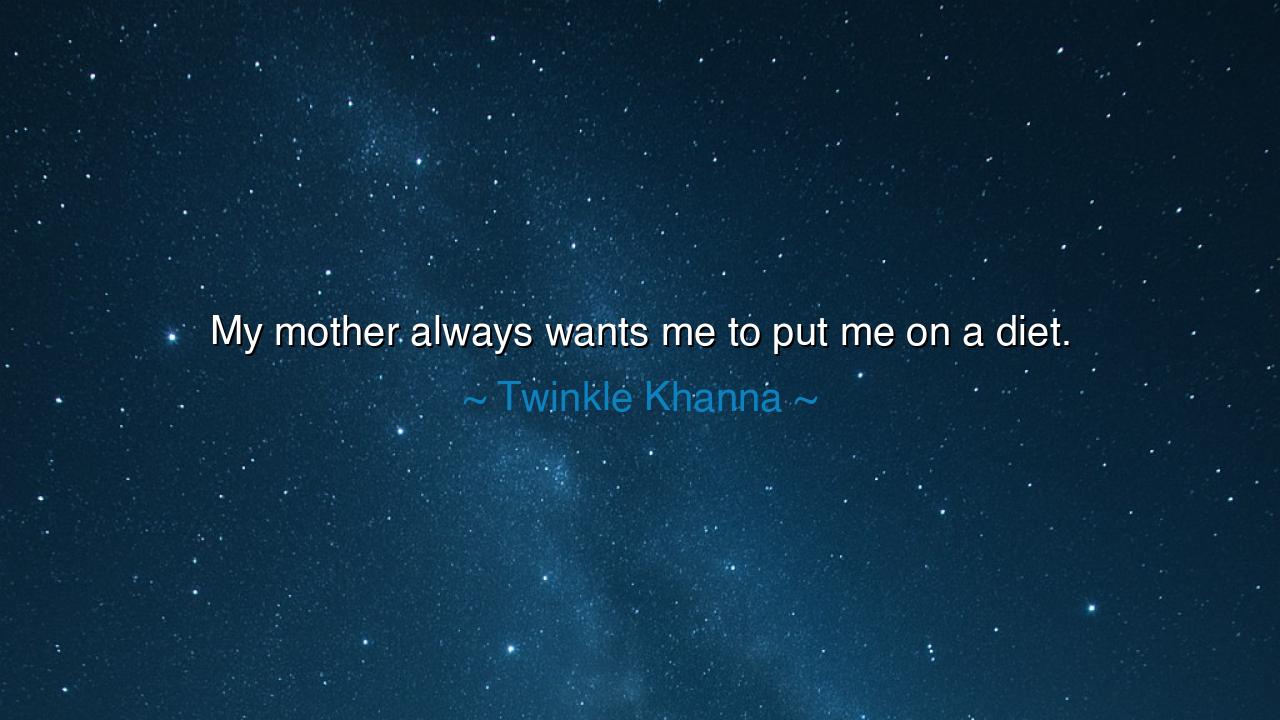
My mother always wants me to put me on a diet.






The words of Twinkle Khanna, “My mother always wants me to put me on a diet,” may appear light, humorous, even ordinary at first. Yet within this simple utterance lies a reflection of one of the oldest human struggles — the tension between love and expectation, between the nurturing of the self and the standards imposed by others. In the playful rhythm of her words hides a universal truth: that those who love us most often wish to shape us, polish us, refine us — not out of malice, but out of care born from their own fears, their own dreams, and their own histories.
From the earliest ages, mothers have been the keepers of balance — guardians of health, beauty, and order. The mother’s guidance is as ancient as time itself. Yet, her voice, though full of tenderness, can sometimes become the echo of society’s expectations. When a mother says, “You should be on a diet,” she is not merely speaking of food; she speaks of discipline, of control, of how one must appear in the world. And therein lies both wisdom and warning — for the same love that seeks to nurture can also constrain, if not tempered by understanding.
In ancient Greece, the philosopher Socrates once said that to know oneself is the beginning of all wisdom. But before one can truly know oneself, one must first untangle the voices of others that live within. The mother’s voice, though sacred, is one of the strongest. It tells us to strive, to improve, to fit into the mold of what is “good” or “proper.” Yet, the path of the wise is not to silence that voice, but to hear it with compassion — to take what is true and loving from it and leave behind what no longer serves the soul. Thus, Twinkle Khanna’s lighthearted remark carries the echo of that eternal dialogue between child and parent, between individuality and expectation.
Consider the story of Michelangelo, who, when carving his great statue of David, was told by others that the marble was flawed — too veined, too weak, unfit for greatness. Yet he saw within it not imperfection, but potential. Like a mother seeking to “shape” her child, the world sought to correct him; but he held fast to his inner vision. When at last the statue was revealed, it stood not as an image of perfection imposed from outside, but as a revelation of beauty liberated from within. So too must each of us learn to see ourselves not through the eyes of others — not even those who love us — but through the quiet truth that resides within our own hearts.
When Twinkle Khanna speaks of her mother’s insistence, she does so with humor, not resentment. This is the mark of wisdom — the ability to see love even in critique, and to smile at it. For love between generations is like the tide and the shore: one shapes the other endlessly, yet both belong to the same ocean. The mother’s concern for her daughter’s diet is not simply about the body; it is an expression of care, the wish to preserve, to protect, to keep her child in harmony with the world’s measure of grace. But the daughter, in her laughter, reminds us that life must also have room for joy, for imperfection, for the freedom to be oneself without fear.
The ancients taught that the body is a vessel of the spirit — not to be starved, nor indulged, but honored. To live wisely is to find the middle path between discipline and acceptance. Thus, the daughter honors the mother by caring for her health, but honors herself by knowing that beauty cannot be weighed, nor worth measured by a scale. The true diet, perhaps, is not one of food, but of thought — to feed the mind with kindness, and to fast from the poison of comparison.
Let this then be the teaching passed down: Accept guidance, but keep your own truth alive. Listen to the voices of love, but let your heart be the final judge. Care for your body, for it is sacred, but never let others’ standards steal the joy from your being. Be both disciplined and forgiving; laugh, as Twinkle does, at the contradictions of life. For in laughter lies freedom — the freedom to love those who shape us, and the courage to remain ourselves.
And so, when the world, or your own mother, urges you to be better, leaner, or more perfect, smile gently and remember: perfection is not found in restraint alone, but in balance. Live with care, live with humor, and live as though every word — even one about a diet — could be turned into wisdom by the light of love.






AAdministratorAdministrator
Welcome, honored guests. Please leave a comment, we will respond soon